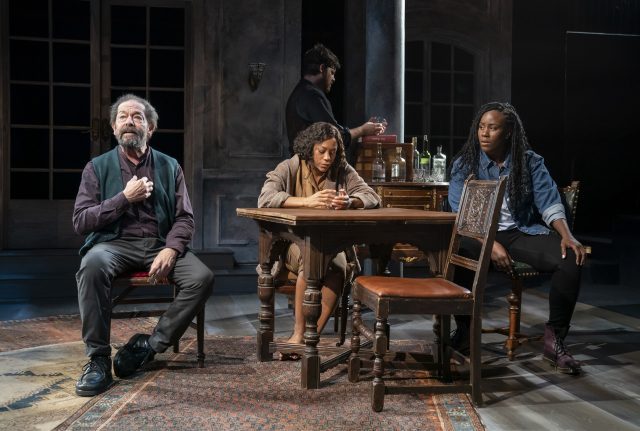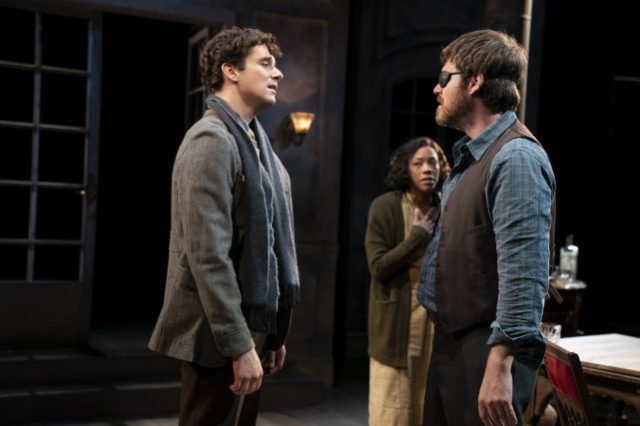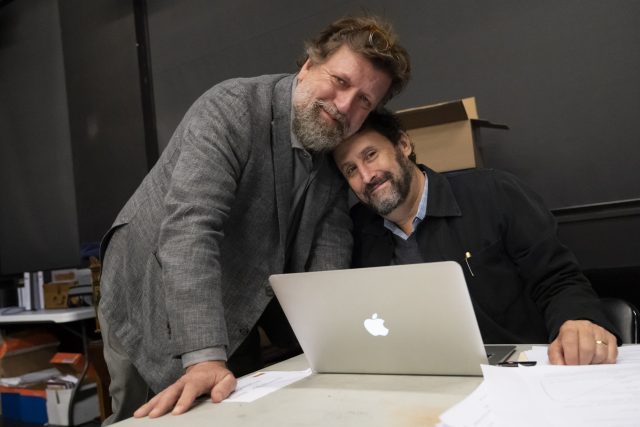
Xillah (Jonathan Hadary) and Zillah (Crystal Lucas-Perry) flank Agnes Eggling (Nikki M. James), in Tony Kushner’s revisiting of A Bright Room Called Day (photo by Joan Marcus)
Anspacher Theater, the Public Theater
425 Lafayette St. at Astor Pl.
Tuesday through Sunday through December 22, $85
212-539-8500
publictheater.org
In October 1987, Tony Kushner’s first play, A Bright Room Called Day, premiered in San Francisco, directed by Oskar Eustis. Inspired by Bertolt Brecht’s 1938 anti-Nazi work The Private Life of the Master Race, Kushner’s play compared the rise of fascism in Germany in 1932–33 with the right-wing Reagan Revolution of the mid-1980s. With fascism and authoritarianism again on the march throughout the world — and, according to many, here in America as well under President Donald J. Trump — Kushner and Eustis are revisiting the drama in an enticing new version continuing at the Public’s Anspacher Theater through December 22. In the original production, the character of Zillah, a young Long Island black woman from the mid-1980s, interrupts the story of a group of bohemians in 1932–33 who are worried where Germany is heading. For this updated iteration, Kushner has drastically rewritten the part of Zillah and has added his alter ego, Xillah, an older white man representing Kushner himself in 2019.
The three-hour play begins with a prologue on January 1, 1932, at a small New Year’s Eve party with actress Agnes Eggling (Nikki M. James), her Hungarian Trotskyite partner, Vealtninc Husz (Michael Esper), opium-smoking actress Paulinka Erdnuss (Grace Gummer), avowed communist Annabella Gotchling (Linda Emond), and the gay Gregor Bazwald (Michael Urie), who may or may not be sleeping with Nazis. Xillah (Jonathan Hadary) first appears in scene two, as Agnes and Paulinka discuss Nazi filmmaking and politics. Xillah walks onto David Rockwell’s cramped, appropriately dingy living room set and says directly to the audience, “Ignore me. I’m not here.” He points at Agnes, who cannot see him, and adds, “She’s about to tell her friend about a meeting she went to, she’s very excited, she — Just watch the scene.” A moment later he explains, “This play, it’s my first play. I wrote it thirty-four years ago. I made this up: the inhabitant of this room, her friends, the room itself, this German room, where it’s 1932 and 1933, and” — he pauses as Zillah (Crystal Lucas-Perry) enters. “Long time no see,” she says to him. He goes on, “I made her up too. She’s this . . . woman in New York, in Reagan America, 1984, 1985. She interrupts the play, at certain intervals she —.” Zillah then cuts Xillah off and tells the audience, “I’m this author-surrogate interruptive-oppositional someone-or-other to whom the playwright neglected to give even a trace of a backstory or anything oppositional to do, to actually do except creep in between the Berlin scenes.” They keep on bickering about whether the original play worked. “Are you here to fix it? Finally?” asks this more potent Zillah, who does a lot more than just creep around.

Baz (Michael Urie) and Husz (Michael Esper) have a disagreement as Agnes (Nikki M. James) looks on in Tony Kushner play at the Public (photo by Joan Marcus)
The answer, of course, is yes. Although I haven’t seen the play before, this new version feels like it has been fixed — in fact, Kushner might have overplayed his hand, as Xillah and Zillah steal the show. While the Weimar Germany characters discuss how to proceed, joined by communist party representatives Rosa Malek (Nadine Malouf) and Emil Traum (Max Woertendyke), an old ghost from Agnes’s dreams (Estelle Parsons), and the devilish Gottfried Swetts (Mark Margolis) — you’ll be eagerly awaiting Xillah and Zillah’s next interruption. The 1930s material is okay but needs the thrilling energy that the anachronistic characters bring to break up the narrative, especially as performed by the wonderful, grandfatherly Hadary (Gypsy, As Is), who is wise and gentle as Xillah, and the powerful, unstoppable force that is Lucas-Perry Ain’t No Mo’, Bull in a China Shop), a charismatic dynamo as Zillah, taking over the stage every time she appears, injecting humor and potent insight.
“It’s 1932, and they’re placing power above the rule of law. It’s 1985, and they’re cynically exploiting racism and economic anxiety and fear of change,” she declares. “It’s 1932, it’s 1985, and they’re propagating a politics of anti-politics, a hatred of the idea of government itself. They’re replacing history with myths of new mornings, dreams of blood purity, of race and gender and sexual purity. It’s 1932, and it’s 1985, and we are in danger.” Left unsaid is that all of that is true again in 2019, and we are in danger once more.

Director Oskar Eustis and playwright Tony Kushner take a break during reboot of A Bright Room Called Day after thirty-four years (photo by Joan Marcus)
Kushner (The Intelligent Homosexual’s Guide to Capitalism and Socialism with a Key to the Scriptures; Caroline, or Change), who won the Pulitzer and two Tonys for Angels in America, and Eustis, the artistic director of the Public who helmed the world premieres of Angels and Kushner’s Homebody/Kabul in addition to the controversial anti-Trump adaptation of Julius Caesar at the Delacorte in the summer of 2017, keep politics at the forefront of their work, but here they successfully avoid didacticism, allowing the audience to figure out most of the parallels between the 1930s, the 1980s, and today, but they do get their digs in. Early on, Xillah says, “Most likely Donald Trump — and this is the last time his name will be mentioned tonight because it is a name that is hateful to God — most likely when you leave the theater in a reasonably little while, he will still be president and you will go to bed unhappy.” When you wake up the next morning, Trump will indeed still be president, but A Bright Room Called Day is likely to have given you a fresh new perspective.